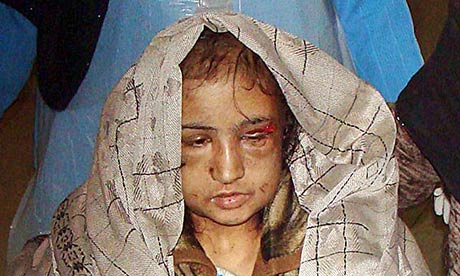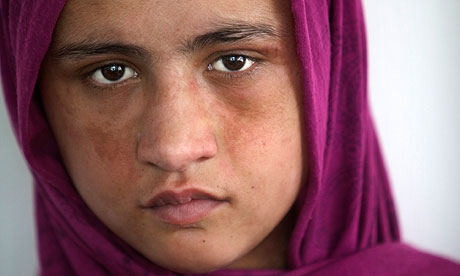
Sahar Gul, then a
15-year-old Afghan wife, being carried to hospital in Baghlan. Her
in-laws tortured her to force her into prostitution. Photograph: Jawed
Basharat/AP
If successful, the small change – introduced covertly into the criminal prosecution code – would stop the vast majority of cases of violence against women from ever reaching court.
Together with the quashing of three convictions for the attempted murder of the teenager Sahar Gul, it marks an alarming two-pronged assault on women's rights by both those who make the laws and those tasked with upholding them.
"The last two months have really been a parade of horrible for women's rights in Afghanistan," said Heather Barr, Afghanistan researcher at Human Rights Watch, warning that the proposed change to the criminal code would leave most abused women with no legal protection against violence.
"Underage marriage, forced marriage, domestic violence, sale of women – these crimes are almost always committed against women by family members, whether through birth or through marriage."
The 10-year sentences handed down to Gul's tormentors last year was hailed as an important step forward, after her case horrified Afghanistan and prompted a bout of national soul-searching.
Sold as a wife when she was an illiterate 12-year-old, her in-laws wasted little time embarking on a campaign of almost unimaginable torture. They starved her, chained her in a basement bathroom, beat her, burned her with red-hot metal pipes and pulled her fingernails out.
By the end of her ordeal she could no longer walk, and was rescued from her makeshift prison in a wheelbarrow. But last week, according to her lawyer and women's activists, a court ordered the release of Gul's mother-in-law, father-in-law, and sister-in-law saying there was no proof of abuse.
No evidence
"This was based on the idea that there was no evidence, but the people who would have given evidence didn't know that the hearing was taking place," said Kimberley Motley, a Kabul-based US lawyer who took on Gul's case last week after learning of the release.Judges ignored the fact that the courtroom was almost empty, with apparently no representation from government prosecutors or the victim, even though both should have been informed under Afghan law.
 Sahar Gul at a women's shelter in Kabul, Afghanistan, last year. She
was not told about the release of her three in-laws, her lawyer said.
Photograph: Kuni Takahashi/New York Times/Redux/eyevine
"Sahar Gul was not told about this," Motley said. "The prosecutor
didn't show up or wasn't informed. I believe the only person in court
was the defence lawyer for the accused."
Sahar Gul at a women's shelter in Kabul, Afghanistan, last year. She
was not told about the release of her three in-laws, her lawyer said.
Photograph: Kuni Takahashi/New York Times/Redux/eyevine
"Sahar Gul was not told about this," Motley said. "The prosecutor
didn't show up or wasn't informed. I believe the only person in court
was the defence lawyer for the accused."Read More Here










No comments:
Post a Comment
Hello and thank you for visiting my blog. Please share your thoughts and leave a comment :)